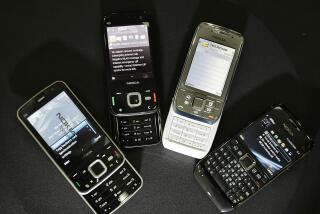And Who Said Talk Was Cheap?
- Share via
Lots of people consider cell phones a vexing leash. But I bought my first one six years ago as an act of liberation.
Until then, I spent a big chunk of my life chained to one place waiting for people to return my calls. The only sure way to get a call returned, of course, is to leave your desk for two minutes. Being able to carry my phone with me meant I could do such things as go to lunch.
There is a price to all this mobility, though. For instance, I can’t remember the last time I used a pay phone. But I can remember the last time I needed to--and couldn’t find one.
I was traveling down the highway, talking with a friend who was having a crisis, when I hit a dead spot--a place where the phone couldn’t maintain a connection. Normally, I’d just redial, but in this case something was jamming the phone’s circuits. I needed to con
tinue this conversation right away. So I raced to the next exit off the 405 to call her back on a pay phone.
After an increasingly frantic and futile search for a familiar phone booth, I jumped back in my car and zoomed along the highway until my cell phone started working again.
Finding a functional pay phone has become increasingly difficult. Running a company that operated pay phones used to be a great way to pay the bills. But those times are gone, and more companies are getting out of the business. BellSouth, for instance, is pulling the plug on all its 143,000 pay phones by December 2002. The company plans to focus on more profitable businesses, such as wireless.
The fact is wireless, in the form of cell phones, has seriously damaged the ability of pay phone operators to make a decent profit. There are about 2 million pay phones in the United States, with a quarter of those supported by about 1,600 independent providers, according to the American Public Communications Council, a trade group that represents these independents.
Since 1997, average pay phone usage has dropped from 720 monthly calls to about 500, with the bulk of that decline occurring since 1998. In addition, new federal rules allow long-distance companies to avoid payments to phone booth operators when the caller uses such services as 800 numbers for collect calls.
Why should we care? Well, the Federal Communications Commission estimates that, even in this age of constant connectivity, more than 5 million American households--that’s less than 5%--have no residential phone service. And perhaps a quarter of all urban households living in poverty don’t have a phone. Without pay phones, or access to a cell phone, which in some cases can actually be cheaper than traditional phone lines, these people are reduced to writing a letter to the fire department to report a blaze.
If you just don’t have a lot of empathy for your fellow man, at least be alert to your own self-interest. You can’t rely on cell phones. If pay phones just disappear, you will eventually find yourself needing to make a call but can’t.
These sorts of changes can have tremendous ripple effects in our society. For instance, airports have seen a substantial loss of revenue from the decline of pay-phone use. In a few cases, those funds have dropped by more than half in the last two years. Many pay phones are installed and maintained by companies that essentially offer a cut of the proceeds to whoever lets them put up a pay phone.
The decline in pay-phone usage by airline passengers, who are more likely than not to own a cell phone, has creamed budgets at some airports. Obviously, this sort of thing won’t shutter your airport, but it does lead to higher coffee prices, fraying carpets and dirty restrooms as other aspects of the operation get squeezed to take up the slack.
There is hope, however. Some companies, notably AT&T;, are building devices about the size of a traditional phone booth that are essentially public Internet access terminals. The company’s 2000i model, for instance, has a 12-inch touch screen and lets users call up a Web page, check e-mail or make a traditional phone call.
But you’re far more likely to see this expensive and relatively delicate replacement for the cheap and rugged pay phone in secure areas such as airports, shopping malls and hospital waiting rooms.
Put another way, the places you’re least likely to find one of these phones--for instance, the gas station that’s closed for the night on a deserted stretch of road where your cell phone can’t make a connection--are the places you’re most likely to need one.
What’s going to happen? Well, assuming there will continue to be a demand for emergency land-line access--and I can’t imagine that there won’t be--my guess is that we’ll pay through the nose for the privilege someday.
Just as early cell phones were hideously expensive and became more affordable as more people came to use them, the cost of using a pay phone will become far more expensive because you’ll be paying for safety and reliability.
My advice: Stock up on those new dollar coins.
*
Dave Wilson is The Times’ personal technology columnist.
More to Read
Inside the business of entertainment
The Wide Shot brings you news, analysis and insights on everything from streaming wars to production — and what it all means for the future.
You may occasionally receive promotional content from the Los Angeles Times.










